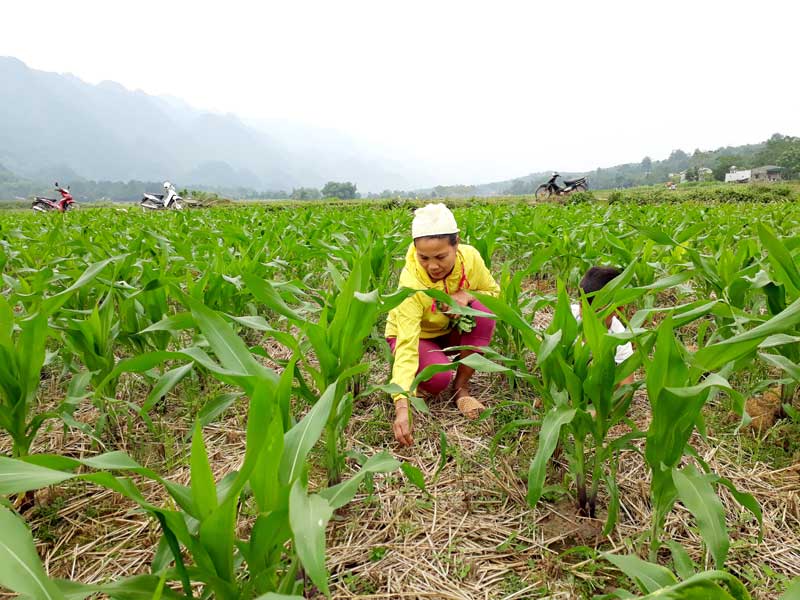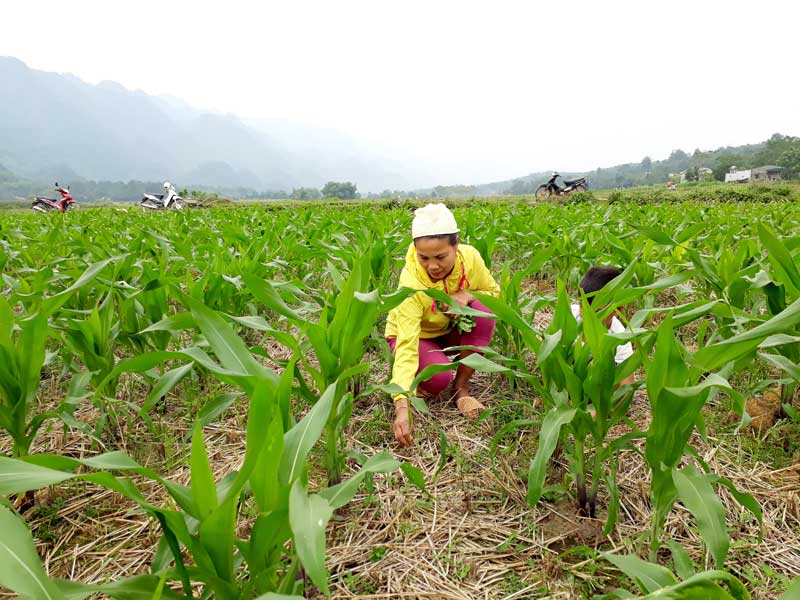
(HBO) – Despite the devastating impacts of the recent floods, farmers in Phu Luong commune, Lac Son district, the northern mountainous province of Hoa Binh, have maintained agricultural production. Over the past nearly ten years, after harvesting the summer-autumn crop, locals continued with the winter crop.
Local farmers are working hard in corn fields. Such vast, green corn fields have erased the image of fields previously destroyed by downpours and floods in many localities of Hoa Binh.
"Over the past ten years, the summer-autumn crop has been followed by the winter crop, mainly corn cultivation. Local farmers also plant vegetables and bulbs like onion in winter. However, a number of fields have been let free during this crop due to impacts of the recent floods. Phu Luong now has 125ha of corn, more than 50ha of vegetables and beans, and 1.5ha of onion,” said Bui Van Au, Vice Chairman of the Phu Luong commune People’s Committee.
Bui Thi Tach from Pheo hamlet, Phu Luong commune, Lac Son district, is taking care of her family’s winter corn field
Thanks to a good water drainage system, the corn field of Bui Thi Tach’s family has not been affected by the floods. Knee-high corn plants are growing together with celery cabbage.
"Traditionally, after the summer-autumn crop, fields were let free until spring. However, over the past ten years, local farmers have cultivated the winter crop. Winter corn plants grow even better than in main crops despite initial difficulties. Unseasonal corn is sold at a higher price while providing animal feed,” Tach said.
To facilitate irrigation, local farmers have dug small cannels around fields.
"The cannels aim to discharge water in case of downpours and bring water to corn fields. Winter corn requires more care in winter. Apart from water, winter corn plants need fertilizers,” Tach added.
Next to fields of Pheo hamlet, fields of Mong hamlet are also covered with green corn plants during this winter.
Winter crop production plays an important role to Phu Luong, a remote commune with a lot of difficulties and poverty rate of over 60 percent.
"Residents of Phu Luong commune, which has been included in the Programme 135, have to face various economic difficulties. Therefore, winter crop production has brought about economic values, helping them increase income and ensure livestock feed. In the years to come, we will continue cultivating winter crops while encouraging local farmers to grow higher-value plants in order to raise income,” said Bui Van Au./.
According to data from the Hoa Binh Provincial Party Committee, the industrial production index for the first six months of 2025 is estimated to have increased by 20% compared to the same period last year. This marks the highest year-on-year growth rate for this period since 2020.
In the first six months of 2025, Hoa Binh province’s export turnover was estimated at 1.145 billion USD, marking an 18.11% increase compared to the same period in 2024. Import turnover was estimated at $ 804 million, a 17.15% increase, which helped the province maintain a positive trade balance.
The lives of the ethnic minority farmers in Tan Lac district have gradually improved thanks to the new directions in agricultural production. This is a testament to the collective strength fostered through the professional associations and groups implemented by various levels of the district’s Farmers’ Union.
With the motto the "product quality comes first,” after nearly one year of establishment and operation, Muong village’s Clean Food Agricultural and Commercial Cooperative, located in Cau Hamlet, Hung Son Commune (Kim Boi district), has launched reputable, high-quality agricultural products to the market that are well-received by consumers. The products such as Muong village’s pork sausage, salt-cured chicken, and salt-cured pork hocks have gradually carved out a place in the market and they are on the path to obtaining the OCOP certification.
In the past, the phrase "bumper harvest, rock-bottom prices" was a familiar refrain for Vietnamese farmers engaged in fragmented, small-scale agriculture. But today, a new spirit is emerging across rural areas of Hoa Binh province - one of collaboration, organisation, and collective economic models that provide a stable foundation for production.
Maintaining growing area codes and packing facility codes in accordance with regulations is a mandatory requirement for agricultural products to be eligible for export. Recently, the Department of Agriculture and Environment of Hoa Binh province has intensified technical supervision of designated farming areas and packing facilities to safeguard the "green passport" that enables its products to access international markets.



